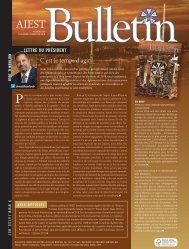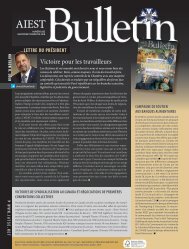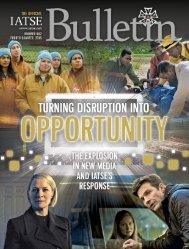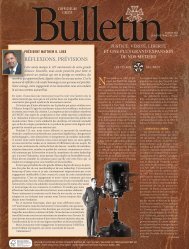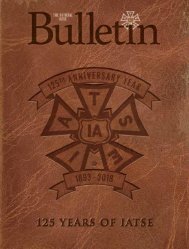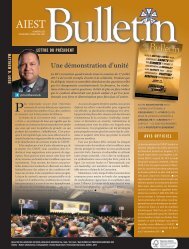You also want an ePaper? Increase the reach of your titles
YUMPU automatically turns print PDFs into web optimized ePapers that Google loves.
injured workers for one year after the<br />
date of the injury; and<br />
n improve benefits both for surviving<br />
spouses and children when a worker<br />
is killed on the job and for young<br />
workers who sustain a long-term<br />
injury that affects their career opportunities.<br />
In the Province of Ontario, the campaign<br />
for change to Ontario’s employment<br />
laws was led by the Ontario Federation<br />
of Labour. Vice President Lewis<br />
served on the Leaders’ Committee, Canadian<br />
Counsel Ernie Schirru served<br />
on the Legal and Research Committee,<br />
and Representative Hurdon served on<br />
the Steering Committee and the Union<br />
Communicators Committee. The tcampaign<br />
and the review process, known as<br />
the Changing Workplaces Review, was<br />
a two year process which culminated in<br />
the passing of Bill 148: Fair Workplaces,<br />
Better Jobs Act in November 2017. Bill<br />
148 contains a number of important<br />
amendments to minimum employment<br />
standards and labour relations procedure,<br />
including:<br />
n ability of trade unions to apply to the<br />
Ontario Labour Relations Board to<br />
obtain an employer’s list of employees<br />
prior to actually filing an application<br />
for certification;<br />
n expansion of card-check certification<br />
to prescribed industries including<br />
building services, home care and<br />
community services, and temporary<br />
agencies;<br />
n improved access to first contract arbitration;<br />
n mandatory three weeks’ vacation after<br />
five years of service with the same employer;<br />
n minimum pay of three hours for<br />
shifts under three hours or when a<br />
shift is cancelled with less than 48<br />
hours’ notice;<br />
n domestic or sexual violence leave – for<br />
which the first five days are paid followed<br />
by an unpaid period that can<br />
extend up to fifteen weeks; and<br />
n increases to the minimum wage to<br />
$14 per hour in January <strong>2018</strong> and to<br />
$15 per hour in January 2019.<br />
New Canadian Cultural Strategy<br />
As previously reported, the Minister<br />
of Canadian Heritage, Mélanie Joly,<br />
announced back in April 2016 that the<br />
Federal Government would be conducting<br />
a sweeping review of Canadian cultural<br />
policy, with a focus on digital technology,<br />
called, “Strengthening Canadian<br />
content creation, discovery and export in<br />
a digital world.” The scope of the review<br />
was massive and it was critical that the<br />
<strong>IATSE</strong> participate.<br />
<strong>IATSE</strong>’s participation started with an<br />
online survey, which helped to determine<br />
the Ministry’s focus and priorities. <strong>IATSE</strong><br />
then engaged in lobbying high-ranking<br />
bureaucrats and officials within the Ministry<br />
of Canadian Heritage. To this end,<br />
Vice President Lewis and Representatives<br />
Neville and Hurdon worked in conjunction<br />
with <strong>IATSE</strong> Canada’s lobbyist Isabel<br />
Metcalfe to arrange lobbying opportunities.<br />
Thereafter, once the Ministry struck a<br />
Standing Committee charged with having<br />
oversight of the review process, the <strong>IATSE</strong><br />
Canadian Office worked with <strong>IATSE</strong>’s<br />
Locals across Canada to schedule meetings<br />
with committee members in their<br />
home ridings across the country. These<br />
meetings were then followed up with<br />
<strong>IATSE</strong>’s filing of formal written submissions.<br />
Vice President Lewis and Representative<br />
Hurdon then went to Ottawa and<br />
joined other industry stakeholders for<br />
the Ministry’s announcement of Canada’s<br />
new cultural and digital content strategy.<br />
The Ministry’s strategy includes many<br />
positives as advocated by <strong>IATSE</strong>, including:<br />
n a commitment to increase investment<br />
to support both domestic production;<br />
n a commitment to promote Canadian<br />
content abroad;<br />
n the creation of a joint industry-government<br />
council to brand Canada<br />
globally;<br />
n an agreement with Netflix that will see<br />
the company investing a minimum of<br />
$500 million in Canadian productions<br />
over the next five years; and<br />
n an increase in the Ministry’s contributions<br />
to the Canada Media Fund<br />
which supports the country’s television<br />
and digital media industries.<br />
Lobbying<br />
<strong>IATSE</strong> Canada will once again participate<br />
in the annual National Lobby<br />
Day, organized by the Canadian Labour<br />
Congress, in February <strong>2018</strong>. Representatives<br />
Peter DaPrato, Jason Vergnano and<br />
Krista Hurdon will represent <strong>IATSE</strong> along<br />
with CLC Delegate Vipond. The Canadian<br />
Office is encouraging all Locals to<br />
send representatives as well. The focus of<br />
this year’s lobbying day will be on, among<br />
other things, the creation of a national<br />
pharmacare program.<br />
<strong>IATSE</strong> Canada will also be participating<br />
in the upcoming first ever Canadian<br />
Media Producers Association lobbying<br />
event in Ottawa in February <strong>2018</strong> which<br />
is aimed at educating politicians on the<br />
importance of the motion production<br />
58 OFFICIAL BULLETIN






